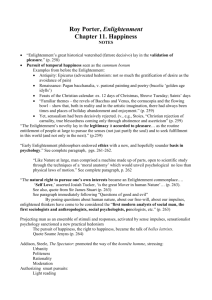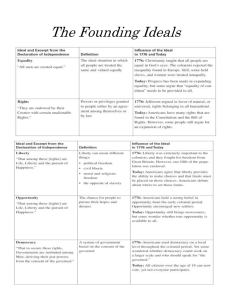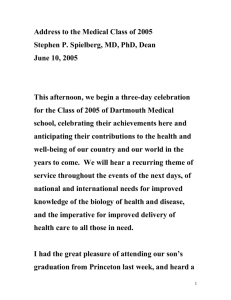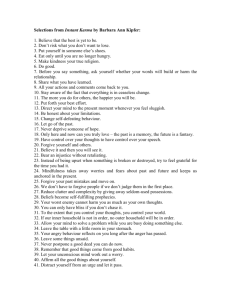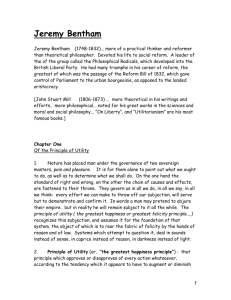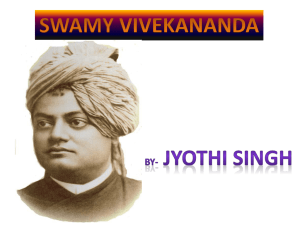Click here to read the essay
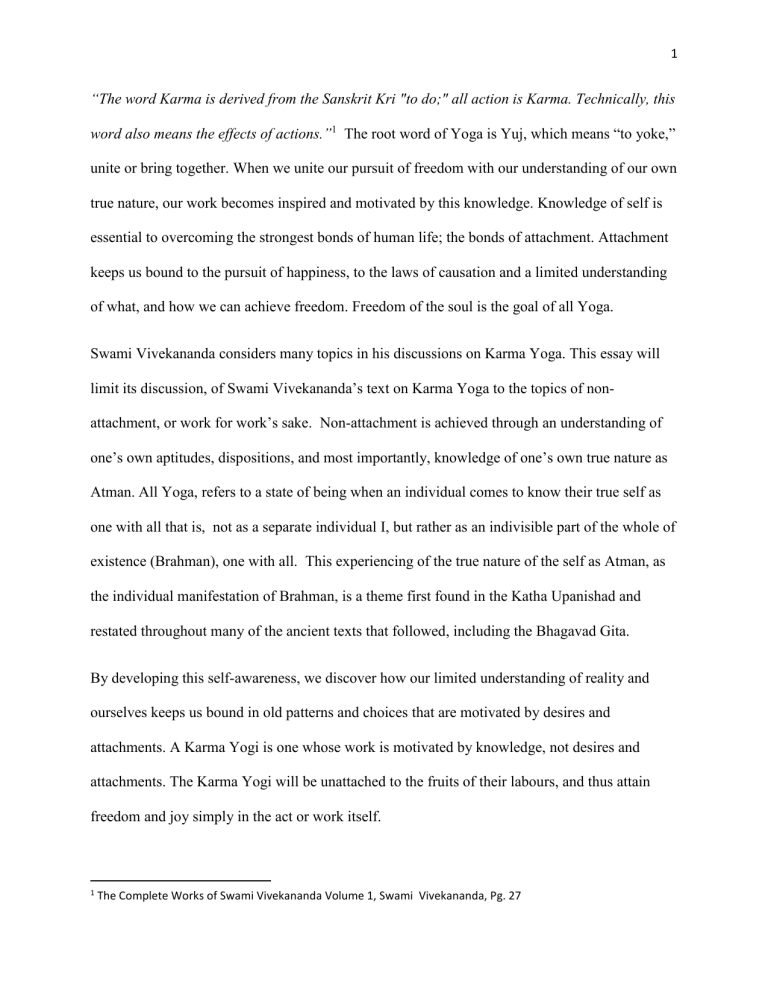
1
“The word Karma is derived from the Sanskrit Kri "to do;" all action is Karma. Technically, this word also means the effects of actions.” 1 The root word of Yoga is Yuj, which means “to yoke,” unite or bring together. When we unite our pursuit of freedom with our understanding of our own true nature, our work becomes inspired and motivated by this knowledge. Knowledge of self is essential to overcoming the strongest bonds of human life; the bonds of attachment. Attachment keeps us bound to the pursuit of happiness, to the laws of causation and a limited understanding of what, and how we can achieve freedom. Freedom of the soul is the goal of all Yoga.
Swami Vivekananda considers many topics in his discussions on Karma Yoga. This essay will limit its discussion, of Swami Vivekananda’s text on Karma Yoga to the topics of nonattachment, or work for work’s sake. Non-attachment is achieved through an understanding of one’s own aptitudes, dispositions, and most importantly, knowledge of one’s own true nature as
Atman.
All Yoga, refers to a state of being when an individual comes to know their true self as one with all that is, not as a separate individual I, but rather as an indivisible part of the whole of existence (Brahman), one with all. This experiencing of the true nature of the self as Atman, as the individual manifestation of Brahman, is a theme first found in the Katha Upanishad and restated throughout many of the ancient texts that followed, including the Bhagavad Gita.
By developing this self-awareness, we discover how our limited understanding of reality and ourselves keeps us bound in old patterns and choices that are motivated by desires and attachments. A Karma Yogi is one whose work is motivated by knowledge, not desires and attachments. The Karma Yogi will be unattached to the fruits of their labours, and thus attain freedom and joy simply in the act or work itself.
1 The Complete Works of Swami Vivekananda Volume 1, Swami Vivekananda, Pg. 27
By freeing himself from the endless pursuit of pleasure and aversion of pain, the Karma yogi
2 achieves liberation. The Karma yogi practices Vairagya , complete self-abnegation or nonattachment. “Vai” means “to dry,” or “be dried,” “raga” means “passion,” “feeling,” “emotions or interest.” Vairagya, therefore, means to be dispassionate or unattached to our passions, emotions and feelings. Non-attachment requires an awareness of our passions, attachments and self- interests. Being so aware allows us to understand and notice how and what we are influenced by, in our decision making. True self-awareness, knowing the self as Atman, will lead to the ability to act with regard for a greater goal than the simple fulfillment of our passions and desires. Such awareness will lead to an understanding of why and how work, based in nonattachment, is the path toward liberation and freedom.
An important idea to keep in mind in our study of Karma yoga, is that Indian Philosophies understand that “ the goal of mankind is knowledge .” 2 The pursuit of knowledge can include knowledge of the self, the phenomenal world and natural sciences all as a part of the goal of mankind. Of these however, it is knowledge of the self that is considered to be the greatest.
“The real which is at the heart of the universe is reflected in the infinite depths of the self. Brahman
(the ultimate as discovered objectively) is Atman (the ultimate as discovered introspectively). Tat tvam asi. Truth is within us.”
3
It has long been thought that the pursuit of happiness is the goal of mankind. However, happiness and pleasure are momentary, transient and impermanent. Happiness and pleasure are often dependent on that which is outside of, or other than, within the self. What we seek or believe to
2 The Complete Works of Swami Vivekananda Volume 1, Swami Vivekananda, Pg. 27.
3 A Source Book in Indian Philosophy, Sarvepalli Radhakrishnan and Charles A. Moore, pg 38.
be the source of happiness or pleasure often can result in suffering and pain. Happiness and pleasure, or even the opposites, pain and suffering, are not inherent in the objects of our desires
3 or aversions, but are a result of our perceptions. To be motivated to act simply for the pursuit of happiness and avoidance of pain will never result in freedom.
“Pleasure and happiness come to an end. It is a mistake to suppose that pleasure is the goal. The cause of all the miseries we have in the world is that men foolishly think pleasure to be the ideal to strive for.” 4
Consider for instance, the pursuit of happiness as it relates to choosing a career. A person may decide to become a doctor because they believe that by becoming a doctor they will achieve wealth and status in society. Furthermore, obtaining a certain status and wealth are believed to bring happiness. Therefore, the study, dedication, cost and effort necessary to become a doctor, i.e. the work of becoming a doctor, will result in happiness that comes from the status and wealth, not as a result of caring for the sick or injured.
In the pursuit of becoming a doctor one might discover that they do not have the personal aptitude to master the studies necessary to become a doctor. The financial and time commitments required to become a doctor result in great hardship not only to oneself but to the family as well. Furthermore, having become a doctor, one might discover that actually caring for the ill and injured makes them miserable. The time commitment of the profession continues to be a hardship on the family, and other unforeseen consequences and costs related to doing the work of a doctor continue to result in greater pain and misery, rather than the pursued happiness and pleasure.
4 The Complete Works of Swami Vivekananda Volume 1, Swami Vivekananda, Pg. 27
The perceived happiness and pleasure that were the motivation to pursue a career as a doctor have not been the result of all the work, cost and effort that went into becoming a doctor.
4
However, one may experience great happiness and pleasure as a doctor if their motivation to become a doctor was based in their love and aptitude toward caring for the sick and injured. If one’s motivation to learn medicine is based in the desire to further develop one’s natural disposition and interest in the biological, physiological, psychological and spiritual aspects of human health, curing disease and caring for the ill, the work itself will become the inspiration, not the status, wealth or other perceived results. When the decision to pursue medicine, and endure all the challenges inherent therein, is based on the knowledge of what really interests and inspires you, the work itself, not the outcome, is its own reward.
Happiness and pleasure come and go; they do not last. In one moment a doctor’s work could result in the wonderful joy of helping a mother bring her baby into the world, and in the next instant the result could be the intense sorrow and pain of having to tell the mother that the baby is stillborn. Pleasure and pain are subject to beliefs and perceptions based on associations, external influences, changing circumstances and fickle desires. As a goal or motivation for our lives, happiness, pleasure and avoidance of pain cannot provide the path toward true freedom, liberation and truth.
It is through conscious work that we become free. This is Karma yoga. Our work becomes conscious through self-knowledge. Self-knowledge leads to overcoming the binding link inherent in the pursuit of happiness. In the Bhagavad Gita, Krishna speaks of
“renunciation and
restriction as necessary practices for a yogin.”
5
“When one does not get attached to the objects
5 of sense or to works, and has renounced all purposes, then he is said to have attained to yoga.”
6
In the earlier chapters of the, Gita it has been explained that work, karma, is inherent in the life of every human being.
“Not by abstention from work does a man attain freedom from action; nor by mere renunciation does he attain to his perfection. For no one can remain, even for a moment without doing work; everyone is made to act helplessly by the impulses born of nature.”
7
But he who controls the senses by the mind, O Arjuna, and without attachment engages the organs of action in the path of work, he is superior.”
8
Krishna indicates that a combination of knowledge and work are how we come to yoga. For
Krishna the highest knowledge of the Self as Atman brings a peaceful and calm self-mastery.
“The ascetic (yogi) whose soul is satisfied with wisdom and knowledge, who is unchanging and master of his senses, to whom a clod, a stone, and a piece of gold are the same, is said to be controlled [in yoga].” 9
When the knowledge that freedom cannot be achieved by simply fulfilling one’s desires and passions the, Karma yogi renounces the pursuit of his desires and thus through Vairagya freedom is attained.
Everything that we know within our universe is molded by the conditions of space, time and causation. The Law of Causation is the way our mind interprets phenomena. Anything that is beyond the range of our mind and our senses is not bound by the law of causation. We identify ourselves with our experiences in the phenomenal world. This is the temporal and conditioned
5 A Source Book in Indian Philosophy, Sarvepalli Radhakrishnan and Charles A. Moore, pg.122.
6 Ibid.pg.123
7 The Bhagavad-Gita, S. Radhakrishnan. pg 133
8 Ibid. pg 134
9 Ibid. pg 191
world. In seeking an understanding of the true nature of the self beyond the limits of time, space
6 and causation, we begin the quest toward the highest knowledge of the self.
As explained in the Isa Upanishad, the highest form of knowledge is the quest for knowledge of
Atman, which is the individual manifestation of Brahman. " From the Upanishadic standpoint, any method that enables us to become aware of the atman or Brahman is referred to as a ‘yoga’ in that it unites us with the infinite dimension within.” 10
“ One who clearly perceives the atman in all beings, and all beings in the atman, does not separate oneself from the cosmic principle.” 11
When realized, our limited identification of self as I, me and mine gives way to “Thou.”
Pleasure, pain, happiness and the like are based in personal perceptions, individual experiences and circumstances. In the pursuit of knowledge we are seeking that which is eternal and universal. Knowledge is the understanding of our essential nature beyond our limited experience in and perceptions of the world. It is through reflection and insight that we gain knowledge of our true unlimited nature. When this knowledge is understood we become inspired to work not for personal or selfish motives, for we are no longer limited by such a misidentification. We become inspired to work toward our highest aim, that which allows for the experience of being one with the all. We experience this when we pursue that which allows for the benefit of our work to be for all. When our work is motivated in this way; we experience our efforts as service for all, not limited to the results of our work but in the motivation and efforts of the work itself.
For those whose works are enlightened with the knowledge of Self as Atman will be inspired by that knowledge and choose to work not for mere personal gain and pleasure, but as a means to
10 Indian Philosophy: An Introduction, M. Ram Murty, pg 94.
11 Ibid, pg 36
7 serve all and thus attain freedom. Work that is inspired by such wisdom is Karma yoga, the yoga for the man of action.
When we are motivated toward achieving a particular end that we believe will bring us happiness and pleasure, and the result is not happiness and pleasure, we may either abandon the goal or perhaps try to achieve the goal through different means. However, if we are motivated to learn and the result of our work is not what was intended, we can reflect on the goal, the means and the result, and thus learn from our experience, even when the end result is not the intended goal.
Through reflection we learn, whether it means we learn about the results of our experiments, the meaning of the text studied, or the nature of our selves, reflection enables us to discover the knowledge that is within. Work that is inspired by the pursuit of true knowledge, will always provide an opportunity to learn, regardless of the outcome.
In themselves, pleasure and pain can be great teachers on the path of knowledge. However, often the greatest lessons in an individual’s life come as a result of the greatest sorrow and pain.
The pursuit of knowledge, as the means to freedom, cannot, therefore, simply rest in the pursuit of pleasure and aversion of pain. Coming to know the true nature of the self as Atman is not subject to the fluctuations of desire, circumstances and outside influences.
As we further our self-inquiry we may learn that we have a particular disposition or talent for a particular type of work. We may then choose to direct our activities to developing or honing that talent. For instance, in the pursuit of a medical doctorate, one may discover themselves more interested in medical ethics and thus choose to pursue policy- making rather than doctoring as a line of work. Medical research may prove to be more suitable for one’s individual talents and
8 interests more than administering medical treatments, thus leading to a career that could result in medical discoveries that benefit the whole of humanity.
Vivekananda suggests that by learning how to use our energies wisely we have the power to make our lives whatever we wish it to be. We all have to work and if we learn what, why and how to work according to our own nature, we use our energy in the best way suited to our talents and interests. Thus, our work enables us to create our lives in pursuit of our highest aim: freedom. Work for the sake of work releases us from the bonds of the endless pursuit of pleasure and aversion of pain. Pursuing freedom through work inspired by self-awareness becomes the means and motivation to overcome our passions, that which is in our very nature that keeps us from freedom.
We all have to work. There are many different motives to work and we must have some type of motive to instigate work. “In addition to meaning work, we have stated that psychologically the word Karma also implies causation. Any work, any action, any thought that produces an effect is called a Karma. Thus the law of Karma means the law of causation, of inevitable cause and sequence…By law is meant the tendency of a series to repeat itself. When we see one event followed by another, or sometimes happening simultaneously with another, we expect this sequence or co-existences to recur. ...A series of phenomena becomes associated with things in our mind in a sort of invariable order, so that whatever we perceive at any time is immediately referred to other facts in the mind.” 12
What we know of the world is known through our experience of the world. As we are a part of the world of phenomena, we know it through the faculties that enable us to experience it. For
12 The Complete Works of Swami Vivekananda Volume 1, Swami Vivekananda, Pg 94.
9 instance, we know the smell of rose through our sense of smell, the colours of a rainbow through our sight, the melody of a bird’s song through hearing. Our mind interprets the raw data of our sensory experiences. The interpretation of this data leads to associations. For instance, I see and smell a beautiful rose. I associate roses with pleasant experiences and I develop a positive association with roses. Because of my previous experience I know I like roses and so choose to plant them in my garden. My action is motivated by my past pleasant experience.
My past encounter with the rose has led to an association of pleasure with roses and this association is the motivation for my choosing to plant roses in my garden. The law of causation suggests that I will enjoy the roses in my garden. However, the scent and beauty of the rose and my affection for it does not exist in the rose itself, but in my association with and memory of my past experience of the rose. That is to say my favourable relationship with the rose is in my mind, not in the rose itself. Because I enjoyed the smell of a rose does not necessarily mean I will enjoy all the work necessary to grow them. However, if I love to garden and my love of gardening is the goal itself, the success of the rose bush blooming will not affect the joy of the work of planting and tending to the rose bush in my garden. And as anyone who has ever planted roses knows growing them in your own garden is a completely different experience then enjoying the scent of a rose.
The law of causation is a theory that has proved incredibly useful in the development of human understanding. It is a framework that enables us to interpret and relate our experience of the world but the law is not in the world, it is in our minds
. “Law is the method, the manner in which
10 our mind grasps a series of phenomena, it is all in the mind…causation does not extend beyond the world of our minds.” 13
The pursuit of freedom cannot be subject to the limitations of the laws of space, time and causality. Our experience and knowledge of the world is subject to the framework through which we experience it. Even what and how we know ourselves in the world, what provides us with happiness and pain is under the influence of space, time and causation. However, just because our minds perceive the world through our cognitive abilities does not mean that all that there is in the world is subject to how the human mind perceives it.
The Karma yogi must expand his quest for freedom beyond the confines and restrictions of the laws of causation. To seek liberation through work implies that the choice of action is made freely and is not determined by the law of causation. How are our choices to truly be free if the knowledge and source of our decision making is only based on what is known through the limitations of our mind’s ability to interpret the phenomenal world? As Vivekananda says;
“It is only when “being”, or existence, gets moulded into name and form that it obeys the law of causation, and is said to be under law; because all law has its essence in causation. Therefore we see at once that there cannot be any such thing as free will; the very words are a contradiction, because will is what we know, and everything that we know is within our universe, and everything within our universe is moulded by the conditions of space, time and causation.
Everything that we know, or can possibly know, must be subject to causation and that which obeys the law of causation cannot be free.”
14
13 The Complete Works of Swami Vivekananda Volume 1, Swami Vivekananda, Pg.95.
14 The Complete Works of Swami Vivekananda Volume 1, Swami Vivekananda, Pg.96.
If what we know through the senses is subject to the law of causation, and coming to an understanding of the self as Atman, the individual manifestation of Brahman, is a pre-requisite
11 for the attainment of yoga, then it follows that the yoga will not be attained through either the senses or through what is known through the senses. The Atman is not merely the sense of “I” we know in the world of sensory experience. Coming to know the unbound infinite nature of true self is not limited to how we know through the world of causation.
Freedom must be attained beyond the limitations of how we know the universe. That which is experienced by the mind through the faculties of the mind is limited to the abilities of the mind.
This aspect of the mind’s ability to know will not allow our access to freedom. We must go beyond it. What we know and experience through the senses leads to our interpretations of relationships with phenomena as pleasant or painful. Our interpretation of, and association with, our experiences in the phenomenal world leads to the belief that obtaining great wealth and stature (as for instance in the case of our student pursuing a medical degree), will bring us happiness and thus the freedom we seek. But, as we have shown, the pursuit of happiness and pleasure is not the route to freedom. What we consider pleasurable and/or painful is learned through our experiences. Pleasure and pain do not exist in anything other than in our mind. Self knowledge, knowing our true nature as Atman, knowing ourselves as something more than a mind that experiences the phenomenal world, will free us from the limitations of how we experience the world. “ Everything that we know, or can possibly know, must be subject to causation, and that which obeys the law of causation cannot be free.”
15
To limit our understanding of ourselves to what and how we have experienced ourselves in the world will
15 The Complete Works of Swami Vivekananda Volume 1, Swami Vivekananda, Pg. 96.
12 keep us bound to the world of causality. Thus freedom will never be achieved through the world of causality, through work motivated to cause a particular result.
If we consider that all that we know and experience in the world as subject to the laws of causation, and our thinking minds incorporate this knowledge into our choices for action and we believe we do have free will, then in order for our actions, choices and lives to be free, our freedom must be based in something more than what we have learned and experienced through our perception of the phenomenal world. Our choices and actions must be based in a knowledge of ourselves that is not limited to our experiences in the physical world.
Our passions, desires, pleasure and aversions are a result of our perception and experiences in the world of phenomena. “All the actions that we see in the world, all the movements in human society, all the works that we have around us, are simply the display of thought, the manifestation of the will of man... Karma-Yoga, the Bhagavad Gita says, is doing work with cleverness and as a science. By knowing how to work one can obtain the greatest results. You must remember that the aim of all work is simply to bring out the power of the mind which is already there, to wake up the soul. The power is inside every man; and so is knowledge...Man works with various motives; there cannot be work without motive.”
16
The Karma yogi, therefore, must find inspiration for their action in more than that which is experienced in the world of phenomena. I suggest that our freedom lies not in physical materialistic nature but in our essential nature. That is, as we come to know our selves beyond the limitations of I, me and mine, as a part of the whole of reality, as Atman, we will no longer be bound to the limitations of the physical world. The desires, pursuits and even knowledge
16 Vivekananda The Yogas and Other Works , Swami Nikhilananda, pg.459.
13 based in the physical plane will not be the sole motivation of our actions when we have seen ourselves to be more than just our mind’s perception of the limited I, me and mine. When we come to know ourselves as Atman, our understanding will be expanded beyond the cognitive limitations of knowledge based in the world of space, time and causality.
“ so we have to go beyond, and real religion begins where this little universe ends. These little joys, and sorrows, and knowledge of things end there and reality begins. Until we give up the thirst after life, the strong attachment to this our transient conditioned existence, we have no hope of catching even a glimpse of that infinite freedom beyond. It stands to reason then that there is only one way to attain to that freedom which is the goal of all the noblest aspirations of mankind, and that is by giving up this little life, giving up this little universe, giving up this earth, giving up heaven, giving up the body, giving up the mind, giving up everything that is limited and conditioned. If we give up our attachment to this little universe of the senses or of the mind, we shall be free immediately. The only way to come out of the bondage is to go beyond the limitations of law, to go beyond causation.” 17
However, to achieve a level of self awareness that leads to non-attachment requires, for most of us, more than mere intellectual understanding. For all but the few with exceptional minds, to come to an understanding of the self as Atman alone, never mind being motivated to work according to this intellectual understanding, is incredibly difficult.
“The vast majority of mankind choose… the way through the world, making use of all the bondages themselves to break those very bondages. This is also a kind of giving up; only it is done slowly and gradually, by knowing
17 The Complete Works of Swami Vivekananda Volume 1, Swami Vivekananda, Pg.97-98.
14 things, enjoying things and thus obtaining experience, and knowing the nature of things until the mind lets them all go at last and becomes unattached.”
18
Knowledge leads to Vairagya, non-attachment. Self realization releases the Karma yogi from the limiting influence of the law of cause and effect. Our work can be inspired by enlightened self knowledge and freed from the binding limitations of the pursuit of pleasure. As Lord Krishna said,
“For no one ever, even for a moment, exists without acting; everyone, regardless of their will, is made to perform actions by the constituents which originate from material nature.” 19
“
Work we have the right, but not the fruits thereof. Leave the fruits alone. Why care for results?
18 Ibid
19 The Bhagavad Gita, A new translation by W.J. Johnson Pg.14.
Vivekananda The Yogas and Other Works , Swami Nikhilananda, pg.461
15
If you wish to help a man, never think what that man’s attitude should be towards you. If you want to do great or a good work, do not trouble to think what the result will be. …We must do the work and find out the motive that prompts us; and in the first years we shall find that almost without exception our motives are selfish. But gradually this selfishness will melt through persistence, and at last will come the time when we shall be able to do really unselfish work.” If you wish to help a man, never think what that man’s attitude should be towards you. If you want to do great or a good work, do not trouble to think what the result will be. …We must do the work and find out the motive that prompts us; and in the first years we shall find that almost without exception our motives are selfish. But gradually this selfishness will melt through persistence, and at last will come the time when we shall be able to do really unselfish work.” 20
The Karma yogin, by practicing Vairagya, informed by knowledge of the self as Atman, will choose to work for the sake of the work, and thus be liberated from the bonds of the endless pursuit pleasure and happiness, thus freedom is achieved.
Bibliography
Moore, Charles A. Radhakrishnan, Sarvepalli.
Source book in Indian Philosophy.
Princeton
University Press. Princeton, New Jersey.1957.
16
Radhakrishnan, Sarvepalli. The Bhagavad-Gita.
Harper Colophon books, Harper & Row
Publishers, (First Harper Torchbook edition). London, England. 1973.
Murty, Ram, M. Indian Philosophy: An Introduction . Queen’s University, Kingston Ontario.
2011.
Swami Vivekananda, The Complete Works of Swami Vivekananda, Volume 1 ,( Mayavati
Memorial Edition). Advaita Ashrama, Mayavati, Pithoragarh, Himalayas. 1972
